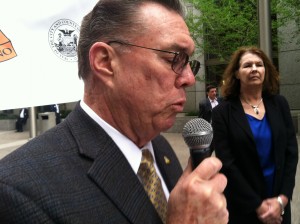The city of San Bruno said that Pacific Gas and Electric should pay $2.25 billion in fines for the gas pipeline blast that killed eight people in September 2010. And the staff of the California Public Utilities Commission agreed. City officials announced their demands Monday morning outside PG&E headquarters during the utility's annual meeting of shareholders.
"I want these shareholders to know that their management has been irresponsible for many years and that they should take that into consideration," said San Bruno Mayor Jim Ruane. "They are scheduled to make a billion-dollar profit this year going forward, and they've made well over $2 billion since the explosion. That's not right."

Ruane said it's going on three years since the disaster and there's still a long way to go.
"The system has been under-maintained for many, many years," he said. "Under-regulated by the CPUC and the relationship is way, way too cozy and we have to stop that right now."
In a separate announcement the CPUC's own Safety and Enforcement Division said it is also recommending PG&E pay $2.25 billion in penalties -- the largest amount ever levied by a state regulatory agency in the nation. The division's director, Brig. Gen. Jack Hagan, said he's recommending the highest possible penalty against PG&E.
"There is no amount of money that will bring back the eight people who tragically lost their lives in the pipeline blast or heal the lasting wounds to the people of San Bruno," Hagan said. "All we can do is make sure such a tragedy does not happen again."